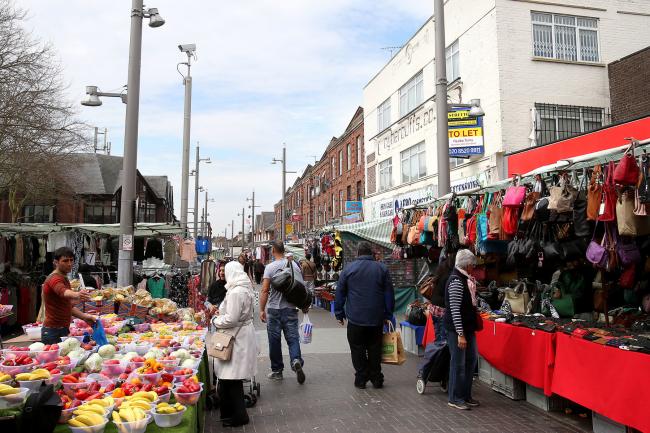‘This Multiculturalism Thing’ Never Gets Old – Welcome To 2013
Walthamstow market
We find ourselves yet again at the beginning of a new, jittery year – 2013, year of the snake. Let’s celebrate by having a look at what BBC Radio 4 sprung on us at the tail end of 2012 – an overview of multiculturalism in London.
“It’s not really multiculturalism that’s being tested here, it’s the human spirit.” – says presenter Mark Easton in the recording of his analysis of London’s ethnic variation – which is true enough for the Beeb. Visiting an East London market, he observes the ways merchants and buyers of vastly different nationalities assemble – not based on culture but on the necessity of getting by. As a due parallel, it’s precisely this basic condition that has offered people like Muhammad Nazir, better known as the One Pound Fish Man, the space to make a living until he got discovered by chance, became an online celebrity and launched a chart hit single. He is now touring the world as a performer. If you’re not among the ten million who saw his sales jingle on Youtube, watch the video below. Coincidentally, it’s been shot in East London, possibly in the same marketplace Mark Easton talks about in his radio show.
At the jewellery shop, a white British woman named Lesley gives an interview saying that she actually “feels like the foreigner now” and it’s making her seriously uncomfortable. Moreover, her daughters cannot get free council flats because of brown and black people ahead of them on the waiting lists, around whom they do not feel safe. We empathize.
On the other hand, many short-term immigrants have some disconcerting views of their own relating to the issue. Mohammad, an Egyptian immigrant, works about 40 hours per week as a chef and pays 36 per cent in tax. In the three years he’s been in the country he gave thousands of pounds to National Insurance, and when his visa expires there will be no choice but take off to greener (or sandier) pastures, leaving behind a hefty contribution to the welfare of the UK. If he doesn’t fall gravely ill before then, and chances are he won’t, there’s no way he’ll ever see the fruits of his mandatory fiscal dues, begging the question of who really is better off from immigration?
Just one out of six people from the borough Newham are white British now, making the rest of five of immigrant descent. One of our employees lives in the borough and believes it’s one of London’s best places for a young person of limited means: rents are comparatively low, it’s close to the city centre (15 minutes by train from Maryland station), the food is great and the human blend makes it never boring. Its reputation as a dangerous, crime-ridden area has in his experience been exaggerated. Police is generally known to frequent disfavoured neighbourhoods out of laziness – hence the stats – but poor does not always equal unsafe. We may have personally encountered far more junkies, criminals and crooks in North London or Hampshire, but that’s altogether a different story best saved for a future occasion.
Back to the issue at hand, our daily naan, as it were: multiculturalism in the UK via Radio 4. After the market scene, the presenter in the audio snippet above moves on to the Spitalfields area, where just off the ‘artsy’ Brick Lane lies the little-known Museum of Immigration and Diversity of 19 Princelet Street, which more or less romantically documents the movement of assorted earthlings through Britain. Here, the show takes on an unexpected turn towards dark humour – paradoxically, an eminently white British characteristic.
The keeper of the museum enthusiastically starts telling Mr Easton about some multiculturalism-related historical gimcracks from the house, but just before dozing off into slumber, the listener is brought back to full sonic awareness by a trill of innocently pure aphoristic nonsense: “I think people are anxious now, people are welcoming now. People were anxious in the past and people were welcoming in the past. The more you look at the different groups – whether it’s the French Huguenots or the Palatines from Germany or the Asians coming from Uganda, whatever group you’re looking at, you find the same patterns,” muses Susie Symes, who’s an economist formerly employed by the Treasury and the EU in Brussels, according to the Guardian. It must be utterly impossible to leave that museum without being fully enlightened as to what “this multiculturalism thing” is: a gesture of pity for the world’s oppressed, reluctantly welcomed to Her Majesty’s fair land out of the proverbial goodness of the British civilised heart. So much for that, then. Time to wrap it up.
Although we deal mainly in marketing and advertising, we could also accommodate workshops for managers of multicultural culture establishments in dire need, given that we hold the subject of their business so close to our decrepit asylum-seeking immigrant hearts. In the meanwhile, 2013 looks like it’s going to be another year of our favourite debate. Watch this space.
Here and Now 365 has always prided itself for promoting multiculturalism and celebrating the ethnic diversity of the UK.
